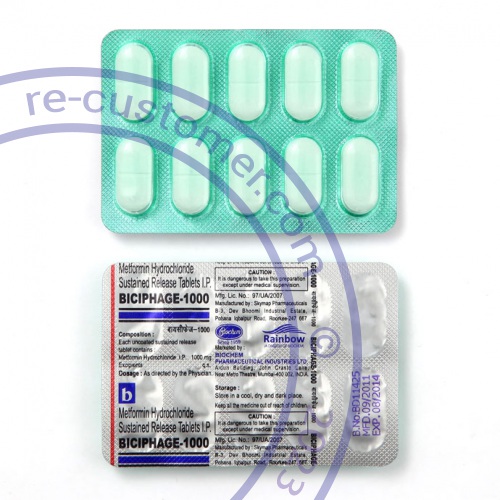 Tenofovir-Emtricitabine300mg + 200mg × 90 tablets × 1 (C$ 342.59)
Tenofovir-Emtricitabine300mg + 200mg × 90 tablets × 1 (C$ 342.59) Zocor10mg × 180 tablets × 1 (C$ 199.30)
Zocor10mg × 180 tablets × 1 (C$ 199.30)
- Trusted Tablets
- Diabetes
- Glucophage XR

Brand(s): Glyciphage SR / Biciphage / Obimet SR
Manufacturer: Franco-Indian Pharmaceuticals Pvt. Ltd. / Rainbow Pharmacy Pvt Ltd / Themis Medicare Ltd.
Disease(s): Diabetes Type Ii
| Package | Price | Per tablet | Savings | Order |
|---|---|---|---|---|
| 500mg × 360 tablets | C$ 346.12 | C$ 0.96 | C$ 683.11 | Add to cart |
| Free AirMail shipping | ||||
| 500mg × 180 tablets | C$ 193.83 | C$ 1.08 | C$ 320.79 | Add to cart |
| 500mg × 120 tablets | C$ 138.45 | C$ 1.15 | C$ 204.63 | Add to cart |
| 500mg × 90 tablets | C$ 106.61 | C$ 1.18 | C$ 150.70 | Add to cart |
| 500mg × 60 tablets | C$ 96.85 | C$ 1.61 | C$ 74.69 | Add to cart |
| 500mg × 30 tablets | C$ 85.77 | C$ 2.86 | Add to cart | |
| Package | Price | Per tablet | Savings | Order |
|---|---|---|---|---|
| 1000mg × 360 tablets | C$ 456.89 | C$ 1.27 | C$ 622.19 | Add to cart |
| Free AirMail shipping | ||||
| 1000mg × 180 tablets | C$ 238.13 | C$ 1.32 | C$ 301.41 | Add to cart |
| Free AirMail shipping | ||||
| 1000mg × 120 tablets | C$ 167.52 | C$ 1.40 | C$ 192.17 | Add to cart |
| 1000mg × 90 tablets | C$ 130.14 | C$ 1.45 | C$ 139.63 | Add to cart |
| 1000mg × 60 tablets | C$ 103.77 | C$ 1.73 | C$ 76.08 | Add to cart |
| 1000mg × 30 tablets | C$ 89.92 | C$ 3.00 | Add to cart | |
Metformin Extended Release tablet
What is this medicine?
METFORMIN is used to treat type 2 diabetes. It helps to control blood sugar. Treatment is combined with diet and exercise. This medicine can be used alone or with other medicines for diabetes.
What should I tell my health care provider before I take this medicine?
They need to know if you have any of these conditions:
- anemia
- frequently drink alcohol-containing beverages
- become easily dehydrated
- heart attack
- heart failure
- kidney disease
- liver disease
- polycystic ovary syndrome
- serious infection or injury
- vomiting
- an unusual or allergic reaction to metformin, other medicines, foods, dyes, or preservatives
- pregnant or trying to get pregnant
- breast-feeding
How should I use this medicine?
Take this medicine by mouth with a glass of water. Take it with meals. Swallow whole, do not crush or chew. Take your medicine at regular intervals. Do not take your medicine more often than directed.
Talk to your pediatrician regarding the use of this medicine in children. Special care may be needed.
Overdosage: If you think you have taken too much of this medicine contact a poison control center or emergency room at once.
NOTE: This medicine is only for you. Do not share this medicine with others.
What if I miss a dose?
If you miss a dose, take it as soon as you can. If it is almost time for your next dose, take only that dose. Do not take double or extra doses.
What may interact with this medicine?
Do not take this medicine with any of the following medications:
- dofetilide
- gatifloxacin
- certain contrast medicines given before X-rays, CT scans, MRI, or other procedures
This medicine may also interact with the following medications:
- digoxin
- diuretics
- female hormones, like estrogens or progestins and birth control pills
- isoniazid
- medicines for blood pressure, heart disease, irregular heart beat
- morphine
- nicotinic acid
- phenothiazines like chlorpromazine, mesoridazine, prochlorperazine, thioridazine
- phenytoin
- procainamide
- quinidine
- quinine
- ranitidine
- steroid medicines like prednisone or cortisone
- stimulant medicines for attention disorders, weight loss, or to stay awake
- thyroid medicines
- trimethoprim
- vancomycin
This list may not describe all possible interactions. Give your health care provider a list of all the medicines, herbs, non-prescription drugs, or dietary supplements you use. Also tell them if you smoke, drink alcohol, or use illegal drugs. Some items may interact with your medicine.
What should I watch for while using this medicine?
Visit your doctor or health care professional for regular checks on your progress.
Learn how to check your blood sugar. Learn the symptoms of low and high blood sugar and how to manage them.
If you have low blood sugar, eat or drink something that has sugar. Make sure others know to get medical help quickly if you have serious symptoms of low blood sugar, like if you become unconscious or have a seizure.
If you need surgery or if you will need a procedure with contrast drugs, tell your doctor or health care professional that you are taking this medicine.
Wear a medical identification bracelet or chain to say you have diabetes, and carry a card that lists all your medications.
What side effects may I notice from this medicine?
Side effects that you should report to your doctor or health care professional as soon as possible:
- allergic reactions like skin rash, itching or hives, swelling of the face, lips, or tongue
- breathing problems
- feeling faint or lightheaded, falls
- low blood sugar (ask your doctor or health care professional for a list of these symptoms)
- muscle aches or pains
- slow or irregular heartbeat
- unusual stomach pain or discomfort
- unusually tired or weak
Side effects that usually do not require medical attention (report to your doctor or health care professional if they continue or are bothersome):
- diarrhea
- headache
- heartburn
- metallic taste in mouth
- nausea
- stomach gas, upset
This list may not describe all possible side effects.
Where should I keep my medicine?
Keep out of the reach of children.
Store at room temperature between 15 and 30 degrees C (59 and 86 degrees F). Protect from light. Throw away any unused medicine after the expiration date.

Can i help you?



